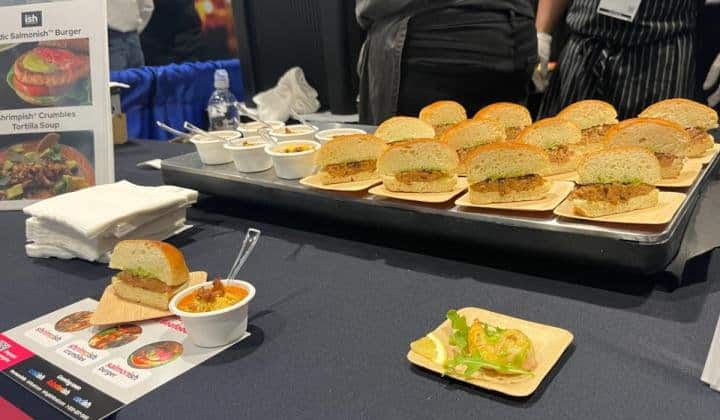
Located in the Startup Alley at the NRA Show this year, The ISH Food Company debuted an impressive lineup of “disruptive” plant-based seafood options. One key benefit? No worries about fish or shellfish allergens. Shrimpish, for example, has coconut listed as its second ingredient, and provides 300 milligrams of Omega-3 fatty acids per serving, which is equal to four to five pieces.
“We’re the only plant-based seafood company that I know of that’s actually fortifying with long-chain Omega 3s, which is what you get from fish oil, but we use them from algae,” says Leann Barden, vice president of research and development at ISH. “That’s one of the biggest reasons people eat fish, and now you don’t have to sacrifice that, and you still get all the heart, brain, and eye benefits—without the mercury, without the slave labor, without the bycatch.”
With 17 percent fewer calories than cooked shrimp, the plant-based product can be grilled, sautéed, fried, and even used as an addition to microwavable entrees, stews, soups, and more. An information sheet featured a recipe for a Shrimpish citrus salad. Shrimpish Crumbles are similar, but are best used as in dishes like street tacos, or Korean-Style dumplings.
But the star of the show was the Salmonish Burgers, made with notes of garlic and herb and providing 14 grams of protein per serving. The product is made with kelp, an ocean-regenerating ingredient high in minerals like potassium and iron, with other ingredients including soy protein, garlic powder, and sea salt. The company featured the product in a Nordic Salmonish Burger recipe, served between a whole-grain bun with Bibb lettuce, thick-sliced tomato, pickled red onion, and basil aioli.
Founded in 2020 by Bernard David, ISH is a certified B-Corp company and is building up a robust pipeline of plant-based seafood products, including Codish, Crabish, Lobsterish, and more to come. One of the biggest differentiators is that all of the ingredients used in ISH products goes through a nutritional screening process using peer-reviewed literature, as well as a sustainability screen which looks at the levels of Co2 in each ingredient.
“One of the reasons that I created this company was actually to figure out a way to change the food system,” David told FSR. “A third of the Co2 emissions come from food and agriculture. So how do you shift that system? And how do you in turn also make people healthy?”
ISH created the nutritional and sustainability screenings as an internal tool, but will soon be releasing it “to the rest of the world, so we can actually help others create a healthier system, whether it’s chefs who are creating recipes, or product developers.”
“What’s really important to us is we’re just serving really delicious food to people that’s really better for them, because that’s what eating plants should be all about,” David adds. “You don’t have to bulk it up with all kinds of garbage.”